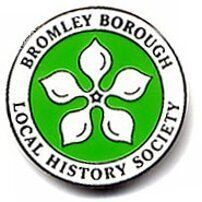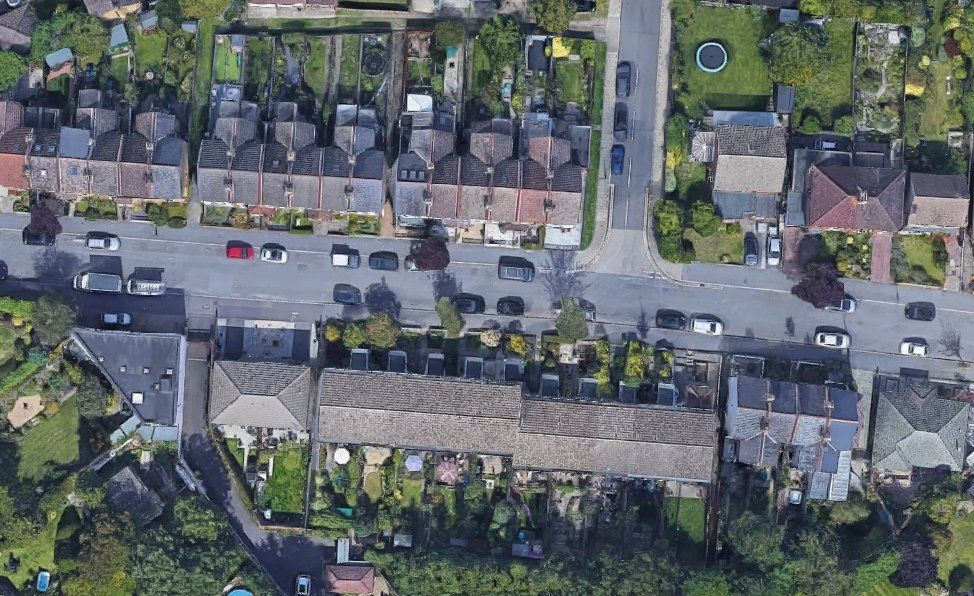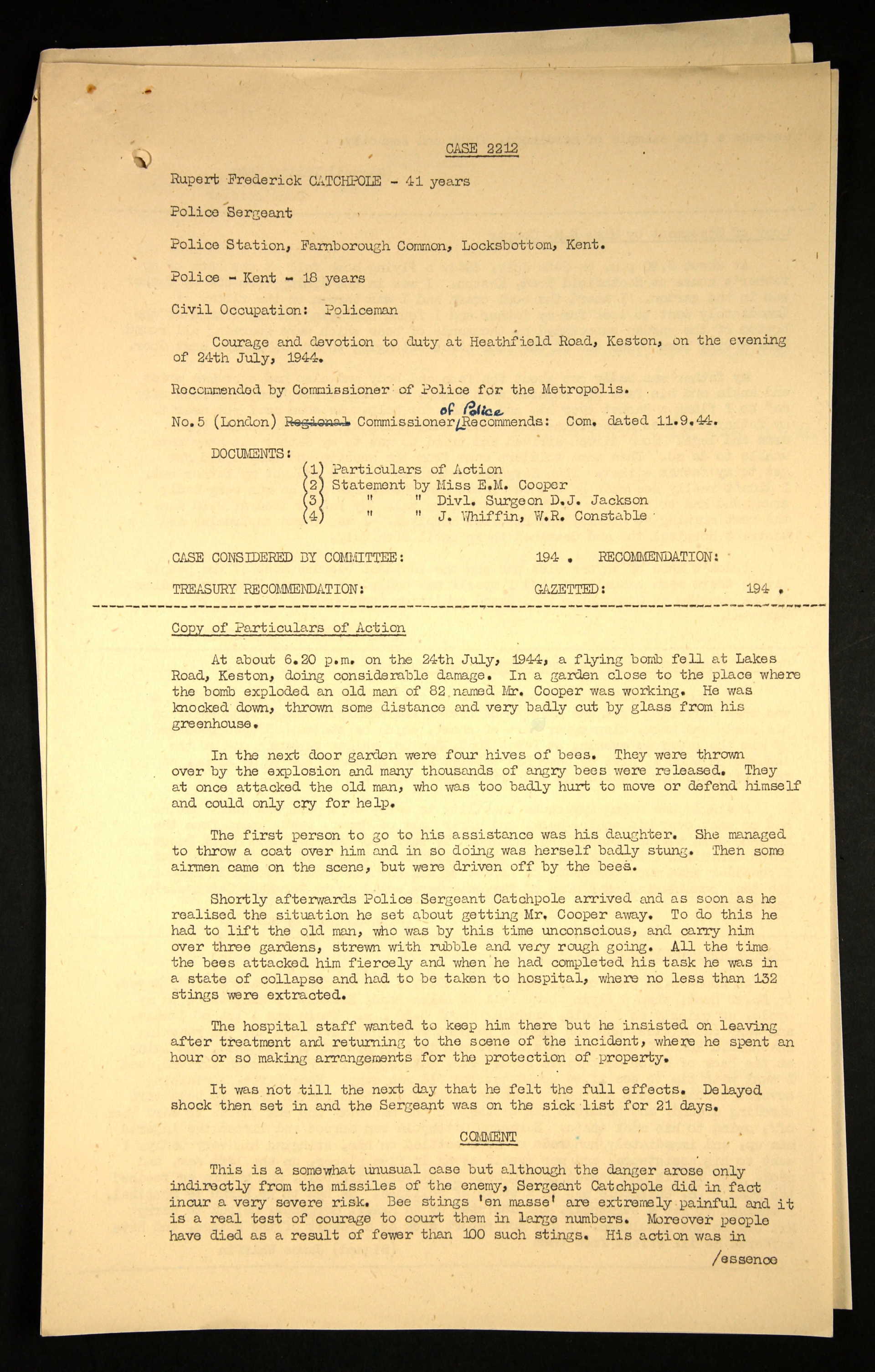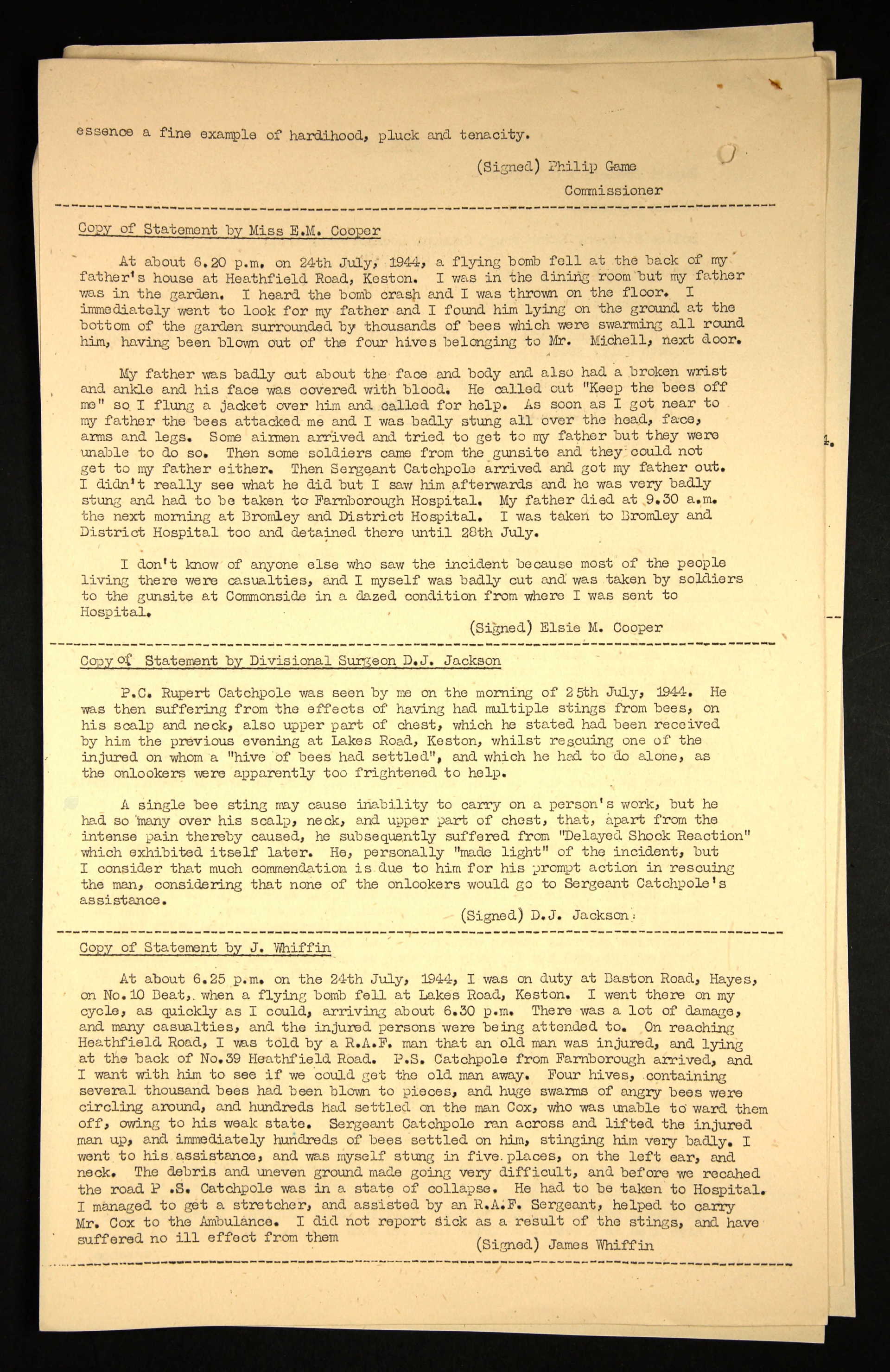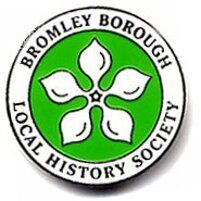CASE 2212
Rupert Frederick CATCHPOLE - 41 years
Police Sergeant
Police Station, Farnborough Common, Locks Bottom, Kent.
Police Kent 18 years
Civil Occupation: Policeman
Courage and devotion to duty at Heathfield Road, Keston, on the evening of 24th July, 1944.
Recommended by Commissioner of Police for the Metropolis.
No 5 (London) Commissioner of Police Recommends: Com. dated 11.9.44.
DOCUMENTS :
(1) Particulars of Action
(2) Statement by Miss Cooper
(3) Statement by Divl. Surgeon D.J. Jackson
(4) Statement by J. Griffin, W.R. Constable
CASE CONSIDERED BY COMMITTEE 194. RECOMMENDATION:
TREASURY RECOMMENDATION: GAZETTED. 194 .
--------------------------------------------------------------------------------------------------------------------------------------------------------------------------------------
Copy of Particulars of Action
At about 6.20 p.m. on the 24th July, 1944, a flying bomb fell at Lakes Road, Keston, doing considerable damage. In a garden close to the place where the bomb exploded an old man of 82 named Cooper was working. He was knocked down, throw some distance and very badly cut by glass from his greenhouse.
In the next door garden were four hives of bees. They were thrown over by the explosion many thousands of angry bees were released. They
at once attacked the old man, who was too badly hurt to move or defend himself and could only cry for help.
The first person to go to his assistance was his daughter. She managed to throw a coat over him and in so doing was herself badly stung. Then some airmen came on the scene, but were driven off by the bees.
Shortly afterwards Police Sergeant Catchpole arrived and as soon as he realised the situation he set about getting Mr. Cooper away. To do this he had to lift the old man, who was by this time unconscious, and carry him over three gardens, strewn with rubble and very rough going. All the time the bees attacked him fiercely and when he had completed his task he was in a state of collapse and had to be taken to hospital, where no less than 132 stings were extracted.
The hospital staff wanted to keep him there but he insisted on leaving after treatment and returning to the scene of the incident, where he spent an hour or so making arrangements for the protection of property.
It was not till the next day that he felt the full effects. Delayed shock then set in and the Sergeant was on the sick list for 21 days.
COMMENT
This is a somewhat unusual case but although the danger arose only indirect1y from the missiles of the enemy, Sergeant Catchpole did in fact
incur a very severe risk. Bee stings 'en masse' are extremely painful and it is a real test of courage to court them in large numbers. Moreover people have died as a result of fewer than 100 such stings. His action was in essence a fine example of hardihood, pluck and tenacity.
(Signed) Philip Game Commissioner
Copy of Statement by Miss Cooper
At about 6.20 p.m. on 24th July; 1944, a flying bomb fell at the back of my father's house at Heathfield Road, Keston. I was in the dining room out my father was in the garden. heard the bomb crash and I was thrown on the floor. I immediately went to look for my father and I Coma him lying on the ground at the bottom of the garden surrounded by thousands of bees which were swarming all round him, having been blown out of the hives belonging to Mr. Michell, next door.
My father was badly cut about the' face and body and- also had a broken wrist and ankle and his face was covered with blood. He called out "Keep the bees off so I flung a jacket over him and called for help. As soon as I got near to my father the bees attacked me and I was badly stung all over the head, face, arms and legs. Some airmen arrived and tried to get to my father but they were unable to do so. Then some soldiers came from the gunsite and they could not get to my father either. Then Sergeant Catchpole arrived and got my father out. I didn't really see what he did but I saw him afterwards and he was very badly stung and had to be taken to Farnborough Hospital. My father died at 9.30 a.m.
the next morning at Bromley and District Hospital. I was taken to Brorn1ey and District Hospital too and detained there until 28th July.
I don't l know of anyone else who saw the incident because most of the people living there were casualties, and I myself was badly cut and was taken by soldiers to the gunsite at Commonside in a dazed condition from where I was sent to Hospital.
(Signed) Elsie M. Cooper
Copy Statement by Divisional Surgeon D.J. Jackson
P.C. Rupert Catchpole was seen by me on the morning of 2 5th July, 1944. He was then suffering from the effects of having had rru1tip1e stings from bees, on his scalp and neck, also upper part of chest, which he stated had been received by him the previous evening at Lakes Road, Keston, whilst rescuing one of the injured on whom a "hive of bees had settled", and which he had to do alone, as the onlookers were apparently too frightened to help.
A single bee sting may cause inability to carry on a person's work, but he had so many over his scalp, neck, and upper part of chest, that, apart from the intense pain thereby caused, he subsequently suffered from 'Delayed Shock Reaction" which exhibited itself later. He, personally made light" of the incident, but I consider that much commendation is due to him for his prompt action in rescuing the man, considering that none of the onlookers would go to Sergeant Catchpole's assistance.
(Signed) D. J. Jackson.
Copy Of Statement by J. Whiffin
At about 6.25 p.m. on the 24th July, 1944, I was on duty at Baston Road, Hayes, on No. 10 Beat, when a flying bomb fell at Lakes Road, Keston. I went there on my cycle, as quickly as I could, arriving about 6.30 p.m. There was a lot of damage and many casualties, and the injured persons were being attended to. On reaching Heathfield Road, I was told by a R.A.F. man that an old man was injured, and lying at the back of No. 39 Heathfield Road P.S. Catchpole from Farnborough arrived, and I went with him to see if we could get the old man away. Four hives, containing
several thousand bees had been blown to pieces, and huge swarms of angry bees were circling around, and hundreds had settled on the man Cox, who was unable to ward them off, owing to his weak state. Sergeant Catchpole ran across and lifted the injured man up, and immediately hundreds of bees settled on him, stinging him very badly. I went to his assistance, and was myself stung in five places, on the left ear, and
neck. The debris and uneven ground made going very difficult, and before we reached the road P .S Catchpole was in a state of collapse. He had to be taken to Hospital. I managed to get a stretcher, and assisted by an R.A.F. Sergeant, helped to carry Mr. Cox to the ambulance. I did not report sick as a result of the stings, and have suffered no ill effect from them.
(Signed) James Whiffin
